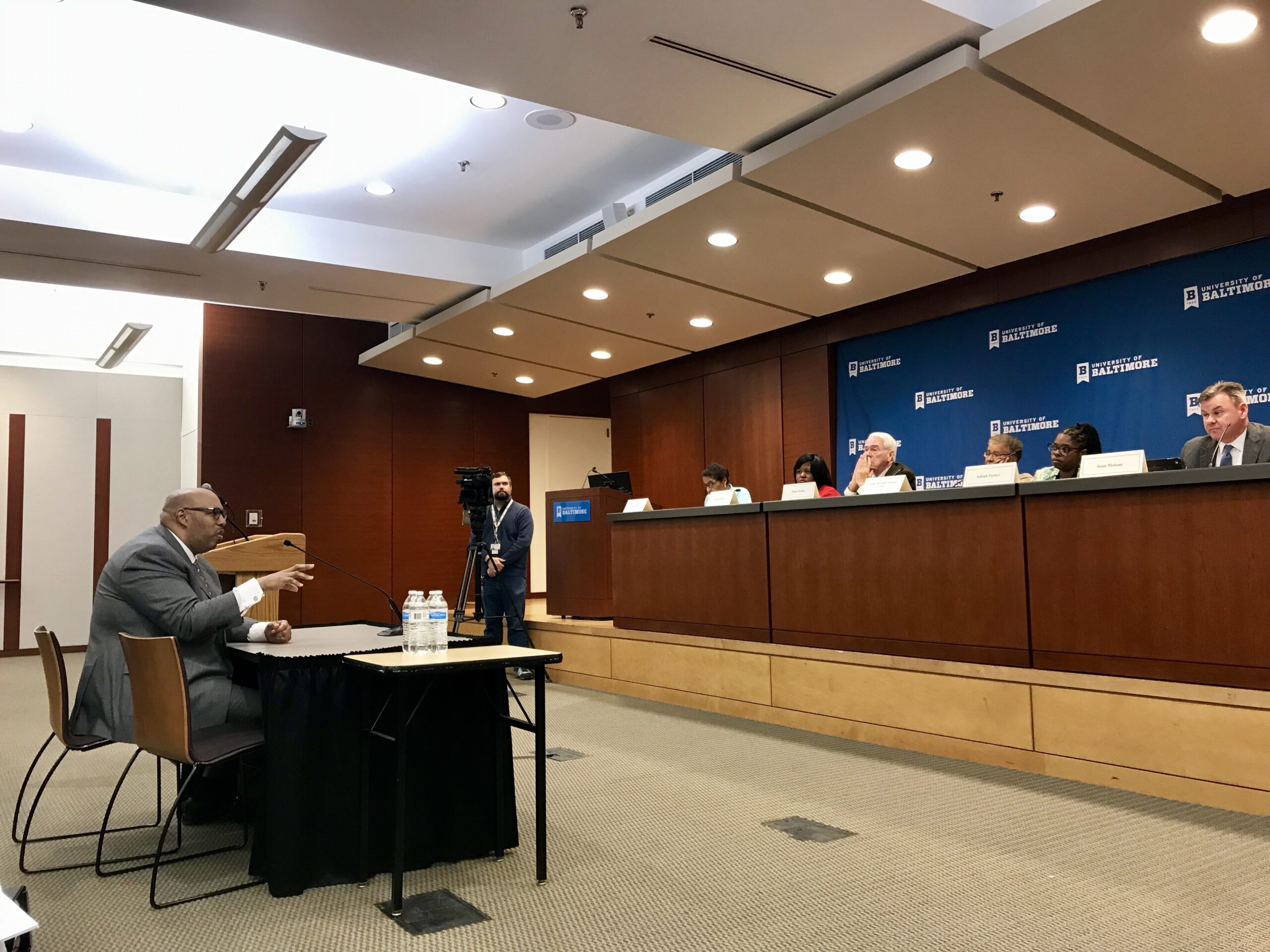
A commission aimed at restoring public trust in the Baltimore Police Department will ask again for internal affairs records of officers involved in the corrupted Gun Trace Task Force.
At the tail end of a meeting in Baltimore on Tuesday, members of the Commission to Restore Trust in Policing discussed their ability to issue subpoenas after learning that the Baltimore City Solicitor’s Office has not responded to requests for the internal affairs records.
“Call one more time,” the commission’s chairman, retired U.S. District Court Judge Alexander Williams Jr., told staff members at the meeting.
The internal affairs documents were among the items identified early as being necessary for the commission to carry out its charge to unravel the culture of corruption that allowed a task force of sworn police officers to run a criminal enterprise from within the Baltimore Police Department.
At a meeting in November, City Solicitor Andre Davis said he would provide the documents to the commission, though most likely under seal. Davis’ office did not immediately respond to messages after Tuesday’s meeting regarding the commission’s request.
The commissioners’ comments about possibly compelling turnover of the records came after a day of testimony about the difficulties of tracking and rooting out bad cops in the police system.
Deborah Katz Levi, director of special litigation for the Baltimore City Office of the Public Defender, said she and her colleagues have to repeatedly jump through hoops to get access to internal affairs records in criminal cases. Judges, Levi said, have relied on case law that internal affairs records are personnel documents shielded from public release. But their use as possible evidence in a criminal trial should not be guided by the Maryland Public Information Act, she said.
Levi suggested that the commission should consider recommending a change in state law to affirmatively open police misconduct records to scrutiny in criminal trials. Other states have made similar changes and the issue is all the more critical in Baltimore where thousands of cases are potentially tainted by the Gun Trace Task Force or other police misconduct.
“We have people being beaten, terrorized and brutalized and we’re still holding these things secret?” Levi asked.
When her colleagues do get access to records, it’s under a protective order or through an agreement covering the single case, so they may have re-litigate in case after case to get access to the same personnel file.
“We’re reinventing the wheel with every case,” Kirsten Gettys Downs, the District Public Defender for Baltimore City, said.
Gettys Downs thinks of her public defenders in the courtroom as “accountability warriors” working each day to gain access to records that guarantee defendants a fair trial.
She said that police corruption has not gone unreported in Baltimore; residents with black and brown skin were coming to court and lodging complaints, but their voices weren’t prioritized.
“This behavior was allowed to grow and grow,” Gettys Downs said.
Levi said that the difficulty in getting records for years had an impact. If defense attorneys and criminal defendants were able to regularly review internal affairs records, problem officers might be identified sooner. She and other defense attorneys pressed for years to review the personnel records of detective Daniel Hersl, one of the convicted task force members who had a reputation for being rough.
Levi also suggested that the commission needed to establish a mechanism through which convicted defendants can revisit their cases if the proceedings were tainted by a lack of disclosure of officer misconduct.
“We are thousands of tainted convictions away from restoring the public’s trust and making victims of police misconduct whole again,” Levi said.
While the Baltimore public defender’s office, state’s attorney’s office and city solicitor have recently struck an agreement to guide the disclosure of internal records, the access to those records shouldn’t rise and fall with the whims of elected state’s attorneys, Levi said.
Former Baltimore Police Deputy Commission Anthony E. Barksdale, who ran the department’s operations from 2007 to 2012, also addressed the commission on Tuesday. He said the city police department needs members who are willing and even eager to root out corrupt colleagues for real accountability to take hold.
Barksdale also said that the city’s declining focus on Comstat and CitiStat could be to blame for the increasing crime rate and failure to catch corruption earlier. He said the Gun Trace Task Force’s seizure numbers and overtime payments alone should have prompted a critical look at the unit’s activities, which may have uncovered wrongdoing earlier.
Barksdale was briefly pressed about whether he’d had a role in creating the Gun Trace Task Force, which first started in 2007. Barksdale clarified that the task force first started as a data gathering exercise to identify the source of guns coming into the city and straw purchasers of firearms, in coordination with surrounding police departments. Over time, and beyond his time with the department, the task force became the street unit indicted for corruption.
“Restoring trust with the community is going to take some time. They did so much damage,” he sighed.
Barksdale repeatedly told the commission that the department needed to implement other safeguards to improve accountability, specifically “integrity stings.”
Barksdale also said the police department needed to take decisive action without delay in cases of police corruption. “When you catch a dirty cop, you’ve got to get rid of them,” Barksdale said.
He also said that the department should better train officers to detect corrupt colleagues and that the police academy should include an entire course on the Gun Trace Task Force, as a cautionary tale.
“I could have never imagined that a group of cops would do this,” Barksdale said. “I don’t think the general public understands how blindsided we were by their behavior.”
Comments from the presenters on Tuesday will be included in a preliminary report from the commission, which will be finalized and sent to the General Assembly by Dec. 31. A final report is due in 2019.




 Creative Commons Attribution
Creative Commons Attribution